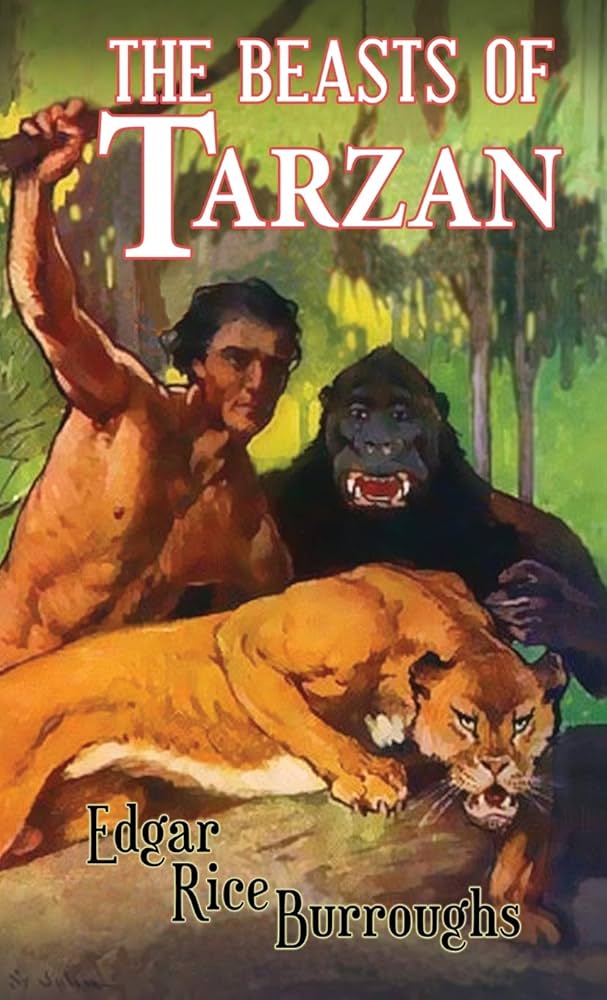Chapter 11 — The beasts of Tarzan
byChapter 11 – The Beasts of Tarzan begins with Tarzan solemnly completing the burial of the Kincaid’s faithful cook, an act that underscores his respect for life, even in the wilderness. With no time to dwell on grief, he resumes his pursuit of the sinister Russian, Rokoff, convinced that Jane has once again fallen into enemy hands. The Ugambi jungle stretches endlessly before him, cloaked in shadows and thick with peril. Tarzan’s every step is weighed down by dread for Jane and their child, whom he envisions suffering under Rokoff’s cruelty. The jungle, once familiar, now feels alien to him as rainstorms rage for days, masking any trail his enemies may have left behind. For the first time, a sense of helplessness clouds his resolve.
After enduring days of storm and fruitless tracking, Tarzan changes his course, hoping that a new direction might yield better results. He moves northeast, trusting his gut and his experience with the jungle. Eventually, a scattered trail leads him to a native village, but the reaction he receives is not welcoming. The villagers retreat in panic, shouting about a “white demon” and a host of monstrous beasts. These lies, planted by Rokoff, have made Tarzan a figure of terror. Determined to get answers, he captures a young warrior who admits that the Russian had recently passed through. This revelation shifts Tarzan’s frustration into focused urgency.
The local chief, M’ganwazam, initially pretends to be a friend, feeding Tarzan and offering shelter. Yet behind his hospitality lies a dangerous ambition: the promise of a reward from Rokoff in exchange for Tarzan’s death. That night, Tarzan senses something is off. As he rests inside his hut, a subtle shift in the air alerts him. From the shadows, a blade flashes toward him, but Tarzan rolls away just in time. His escape is narrow, and the betrayal cuts deeper than the weapon could.
As dawn breaks, Tarzan contemplates leaving before more traps are sprung. Before he can act, a frail voice calls to him from the edge of the village. Tambudza, an old woman he had once protected, stands cloaked in secrecy and fear. She reveals the truth: M’ganwazam aims to betray him, lured by the promise of gold and favor from the Russian. Her eyes shine with urgency as she shares what she knows—Rokoff is still nearby. Without hesitation, she offers to guide Tarzan, driven by gratitude and quiet courage. Her loyalty provides a rare light in the deepening darkness of treachery.
Unbeknownst to them, Buulaoo, the chief’s cunning son, listens intently from the shadows. His loyalty lies not with his father nor with the stranger, but with his own ambitions. The knowledge he overhears may soon be used to strike a devastating blow. Tarzan, however, remains unaware of the new threat brewing behind him. Focused on the path ahead, he prepares to follow Tambudza into the heart of danger. Her frail form may move slowly, but her knowledge is the key to uncovering Rokoff’s hidden camp.
The jungle thickens as they travel, every sound suggesting an unseen predator or spying enemy. Tambudza moves with care, using ancient paths and old instincts to lead the way. Tarzan watches her closely, his respect growing for her bravery and wisdom. Meanwhile, the ghosts of his fear and fury follow him, igniting his determination to find Jane and their son. Every step through the underbrush feels like a march against fate itself. The tension is sharp, not only from the environment but from the moral weight of the decisions Tarzan must make.
The narrative at this stage becomes a crucible of emotional and physical survival. Tarzan’s struggle is no longer just about pursuit—it’s about knowing whom to trust, when to act, and how to outwit enemies in both human and animal form. The jungle is unforgiving, but so is Tarzan’s will. With every betrayal he uncovers, he becomes sharper, harder, more focused. This chapter deepens the sense of isolation and urgency, yet hints at an approaching convergence—where truths will collide, and justice, though delayed, will be served.

